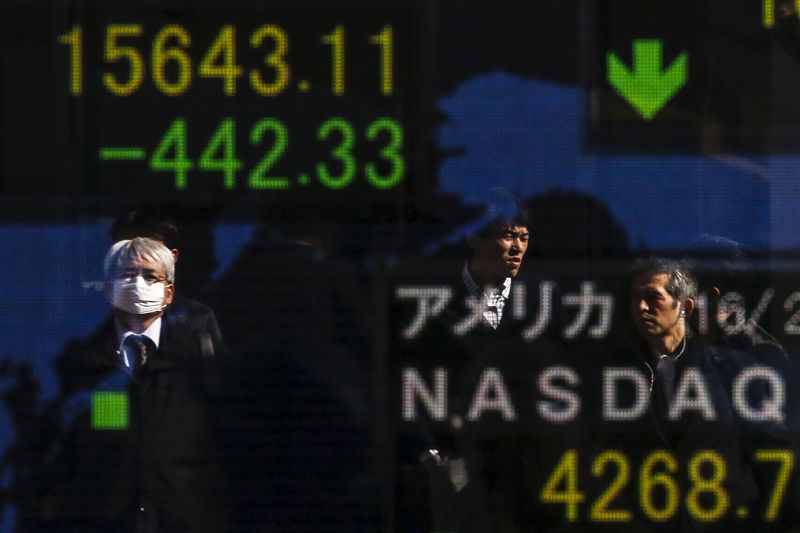By Saikat Chatterjee
HONG KONG (Reuters) - Asian shares rallied to two-month highs on Wednesday as overnight gains in oil prices and a swath of positive economic data from Australia to the United States calmed fears of a global economic slowdown.
Stock markets across the region were in the black, led by Japan and Hong Kong, with announcements from China this week of a cut in bank reserve requirements and structural reforms helping underpin sentiment.
The Nikkei (N225) was up 4 percent and Hong Kong's Hang Seng Index (HSI) by 2.6 percent.
MSCI's broadest index of Asia-Pacific shares outside Japan rose 2 percent to its highest levels since Jan. 7, and building on gains in the previous session.
"While we remain cautious on the outlook, we don't think the global economy is going to tip into a recession," said Geoff Lewis, Hong Kong-based senior strategist at Manulife Asset Management. "Much of the bad news is already priced into markets offering investors areas of opportunity."
The Institute for Supply Management's (ISM) index of U.S. factory activity, a closely-watched measure of the American manufacturing sector, rose more than expected last month. It also edged up for two months in a row, appearing to have snapped its almost continuous decline since late 2014.
U.S construction spending rose to the highest level since October 2007 while solid GDP data from Australia and Canada helped.
"Following the selloff and the fears of recession that emerged early in the new year, people pulled back aggressively from their previous expectations about how a rate hike from the Fed might unfold," said Stefan Worrall, director of Japan equity sales at Credit Suisse (VX:CSGN).
"Suddenly some of this lost confidence has been restored as we've seen a lot of recent economic data from the U.S. beating expectations."
The data helped lift the U.S. S&P 500 Index (SPX) 2.39 percent to an eight-week high of 1,978.35. Stock futures pointed to further gains.
MSCI's broadest gauge of the world's stock markets also rose to highest level in almost two months.
Even in credit markets, where high yield debt has been dumped by investors on worries of growing bankruptcies, an index (HYG) measuring its performance has bounced by 7 percent since mid-February.
Investors unwound bets in safe-haven assets such as government bonds, with the 10-year U.S. Treasuries yield (US10YT=RR) rising to 1.85 percent on Tuesday from 1.740 percent the previous day.
The policy-rate sensitive two-year yield rose to 0.847 percent (US2YT=RR) from 0.789 percent.
U.S. interest rate futures <0#FF:> are pricing in the Fed funds rate of 0.65 percent in January, effectively pricing in a full chance of a rate hike this year.
As the prospects of higher U.S. rates burnished the dollar's yield attraction, the dollar's index against a basket of six major currencies (DXY) <=USD> briefly rose to a one-month high.
Against the yen, the dollar rose to 114.05 yen
The euro
In the oil market, Brent crude futures hit eight-week high of $37.25 per barrel, up more than $10, or 37.5 percent, from a 12-year low of $27.10 hit in January.
U.S. crude futures also hit a one-month high of $34.76 per barrel although gains were cut in post-settlement trade on Tuesday after data suggesting a huge build in U.S. crude stockpiles already at record high levels.

Market players are also keeping an eye on U.S. Super Tuesday, where Donald Trump looked poised to strengthen his lead in the Republican presidential race.